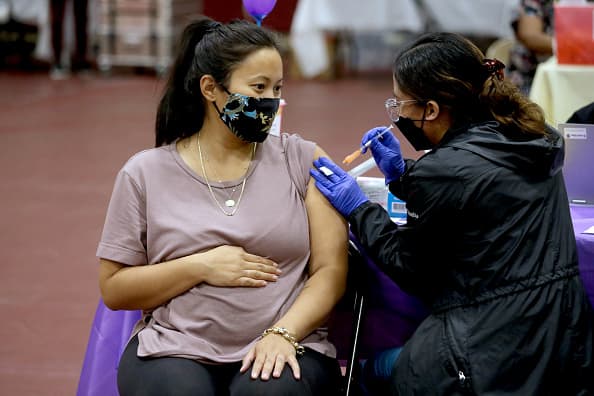Cases of a seemingly rare COVID-19 variant known as "deltacron" have emerged in several countries so far this year, but what is it and what do we know so far?
The hybrid strain has been making headlines since January, when researchers said they first detected it, but many experts were quick to question it.
So far, 17 cases have been confirmed worldwide, according to Reuters.
Here's a breakdown.
Feeling out of the loop? We'll catch you up on the Chicago news you need to know. Sign up for the weekly Chicago Catch-Up newsletter here.
What is Deltacron?
The World Health Organization last week confirmed the emergence of "deltacron" - a hybrid strain that combines both the delta and omicron variants.
News of the variant first surfaced in January, when Bloomberg News reported that a researcher in Cyprus had discovered a strain of the coronavirus that combines the delta and omicron variant.
Leondios Kostrikis, professor of biological sciences at the University of Cyprus, called the strain "deltacron," because of its omicron-like genetic signatures within the delta genomes, Bloomberg said.
But some experts quickly expressed doubts about the findings.
A WHO official tweeted at the time that "deltacron" is "not real" and "is likely due to sequencing artifact."
Dr. Krutika Kuppalli wrote that there was likely to have been a "lab contamination of Omicron fragments in a Delta specimen."
"Let's not merge of names of infectious diseases and leave it to celebrity couples," she said in a later tweet.
Chicago's top doctor at the time said variants are likely to continue developing during the pandemic, but "deltacron" was "not a formal word."
"It's a word that people are using. I think it's reflecting a fear that we're not done with variants, and I see no reason to think we are done with variants, just to be really clear about that," Arwady said. "The way people are using that is this concern [that] already omicron has almost all the characteristics of delta and it has most of the same genetic changes that delta had. But it's this idea of sort of pulling together some of what was worse with delta with some of what is worse with omicron. And, you know, there have been some individual cases where we've seen some additional genetic patterns."
But at a press conference Wednesday, Dr. Maria Van Kerkhove, WHO's technical lead for COVID-19, said cases of deltacron have been reported in Denmark, France and the Netherlands. She noted the levels of detection are "very low," however.
In a tweet last week, Van Kerkhove explained the possibility of a delta and omicron recombinant virus should be expected due to "intense circulation" of both variants.
The WHO health official said there is "very good surveillance in many countries right now," and "given the sheer number of changes and mutations within omicron, it was much easier for researchers, scientists, public health professionals, people who are studying the genome, to be able to detect these recombinants."
How many cases have been reported so far?
Cases have been identified in at least 17 patients, according to Reuters.
Is Deltacron in the US?
According to a study published by research site medRXiv over the weekend, which has not yet been peer reviewed, at least two cases were discovered by researchers in the U.S., though the Centers for Disease Control and Prevention has not yet addressed the variant and does not list it among those being monitored in the U.S.
The study, which was conducted by the CDC-affiliated lab Helix, claimed researchers "identified two independent cases of infection by a Delta-Omicron recombinant virus, where 100% of the viral RNA came from one clonal recombinant."
"Delta-Omicron recombinant viruses were rare, and there is currently no evidence that the two Delta-Omicron recombinant viruses identified are more transmissible between hosts compared to the circulating Omicron lineages," the group stated.
How worried should you be?
Since many instances haven't been confirmed, it's too early to know how transmissible deltacron infections will be or if they will cause severe disease, Philippe Colson, a researcher who published a report regarding three cases in France, told Reuters.
The patients described in the aforementioned report were infected with a strain that combines the spike protein from an omicron variant with the "body" of delta variant.
Experts who talked to USA Today say it's too early to be concerned about deltacron.
"It's only a variant if it produces a large number of cases," William Hanage, an epidemiologist at the Harvard T.H. Chan School of Public Health, told the newspaper. "So no, if it's not causing lots of cases, people don’t need to be concerned."
No change in severity has been reported, according to WHO, and more studies are underway to learn more about the variant.
Arwady said in January that additional variants are reported frequently, but stressed there is a process for classifying them. The potential "deltacron" cases are being monitored, but she said it is not concerning until a variant has been labeled a variant of interest or concern.




